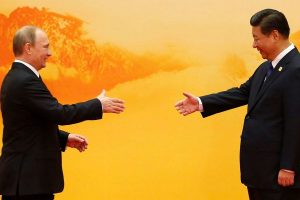China and Russia agree to boost ties in a 'strategic priority' area — nuclear power

- Xi Jinping and Vladimir Putin took part in virtual ceremony to launch construction of new reactors in joint project.
- Xi also called for more cooperation on climate change and says their countries should “play a constructive role in achieving global sustainable development goals.”
- See more stories on Insider’s business page.
China and Russia have agreed to deepen cooperation on nuclear energy and pledged to play a bigger role to combat climate change during a virtual ceremony on Wednesday.
Meeting by video link, Chinese President Xi Jinping and his Russian counterpart Vladimir Putin took part in the ceremony to launch the construction of four new reactors at two nuclear plants in China.
The reactors use Russian technology and the two plants — Tianwan in Jiangsu and Xudapu in Liaoning — are part of a US$2.9 billion nuclear energy deal signed in 2018.
When completed, the four new reactors are expected to have a combined annual power generation capacity of 37.6 billion kilowatt-hours, state broadcaster CCTV reported. That could translate to an estimated reduction in carbon dioxide emissions of 30.68 million tonnes per year by lowering fossil fuel use, according to the report.
China and Russia are seen to be moving closer as both countries’ relationship with the United States continues to deteriorate.
Their latest exchange comes as US Secretary of State Antony Blinken is in Iceland for talks on climate change and will meet Russian Foreign Minister Sergey Lavrov on the sidelines of the Arctic Council ministerial meeting on Thursday to confirm a presidential summit in June.
Yang Jin, an expert on Russian affairs with the Chinese Academy of Social Sciences, said Beijing and Moscow were responding to growing pressure from the West.
“There will be more cooperation on a wide range of issues, including the Iran nuclear issue, space, UN reform and climate change,” Yang said.
During the ceremony, Xi said energy had always been the most important and wide-ranging area for the two countries to work together, with nuclear power a “strategic priority.”
The Chinese leader called the four new reactors a landmark achievement and stressed that they should be built and run in a way that created a global benchmark for nuclear safety. Xi also called for more scientific and technological cooperation in the area of nuclear energy and on efforts to tackle climate change.
“Responding to climate change is a common task for all countries,” Xi said. “China and Russia should promote more low-carbon cooperation projects and play a constructive role in achieving global sustainable development goals.”
Russian affairs expert Yang called the nuclear energy deal a “win-win situation.”
“Russia has the most advanced nuclear energy technology and it is … further developing that technology and obtaining funding,” he said. “China can ensure its nuclear power plant expansion makes smooth progress as it tries to improve the energy structure.”
China is speeding up its nuclear development as it seeks to reduce reliance on coal-fired plants to meet ambitious targets of reaching peak greenhouse gas emissions by 2030 and becoming carbon neutral by 2060.
As of April, the number of nuclear power units in operation in the Chinese mainland had reached 49, ranking third globally, according to data from the National Energy Administration.
In addition, five new nuclear power units were approved for construction in April — the four reactors launched on Wednesday and a 125-megawatt small modular reactor in Hainan province — with a total installed capacity of 4.9 gigawatts, or about 10 per cent of the country’s total, Reuters reported.
China is also pushing forward an upgrade to its third-generation nuclear technology, Hualong Two. The China Nuclear Energy Association expects the country to have installed or have under construction a total of 200 gigawatts of nuclear capacity by 2035, the report said.
Source: Read Full Article
